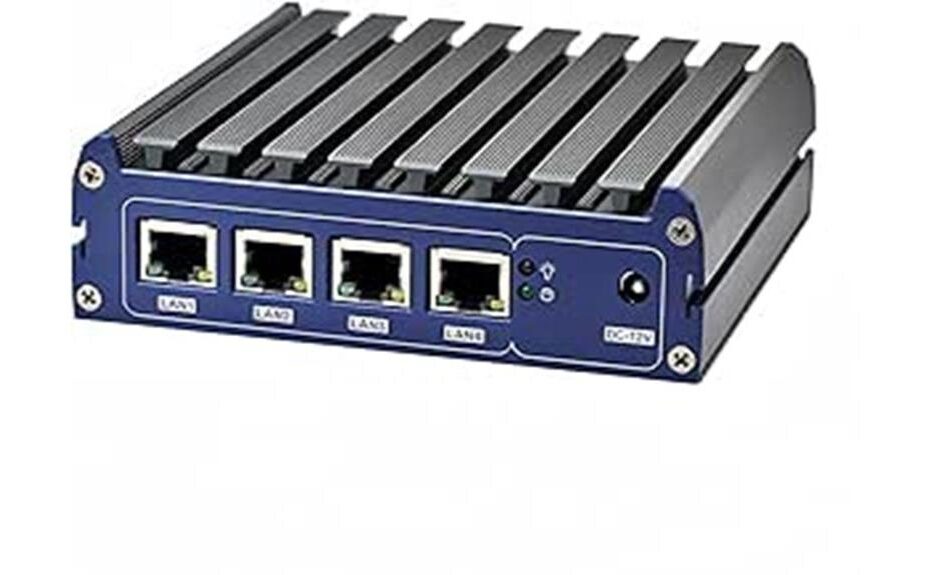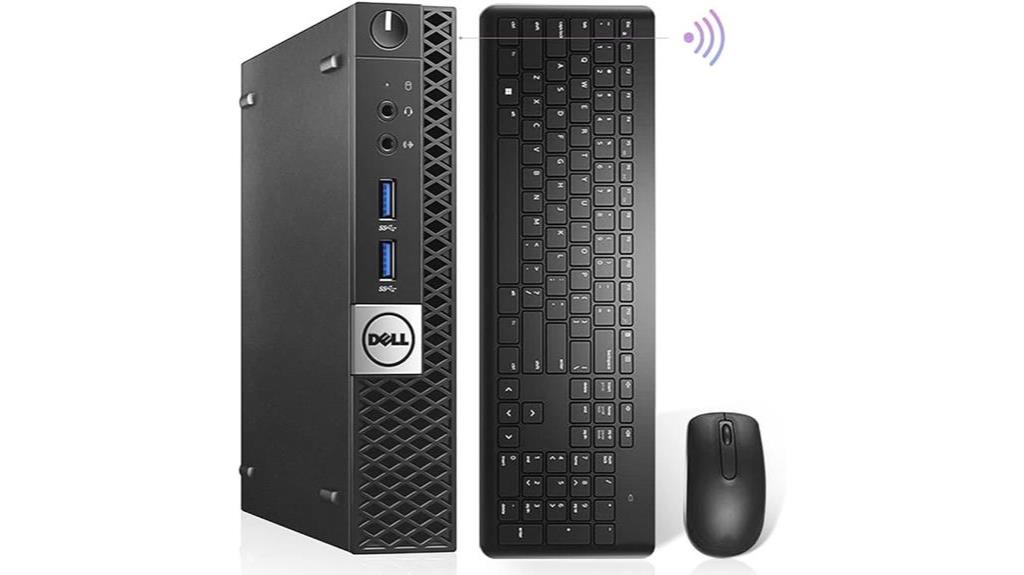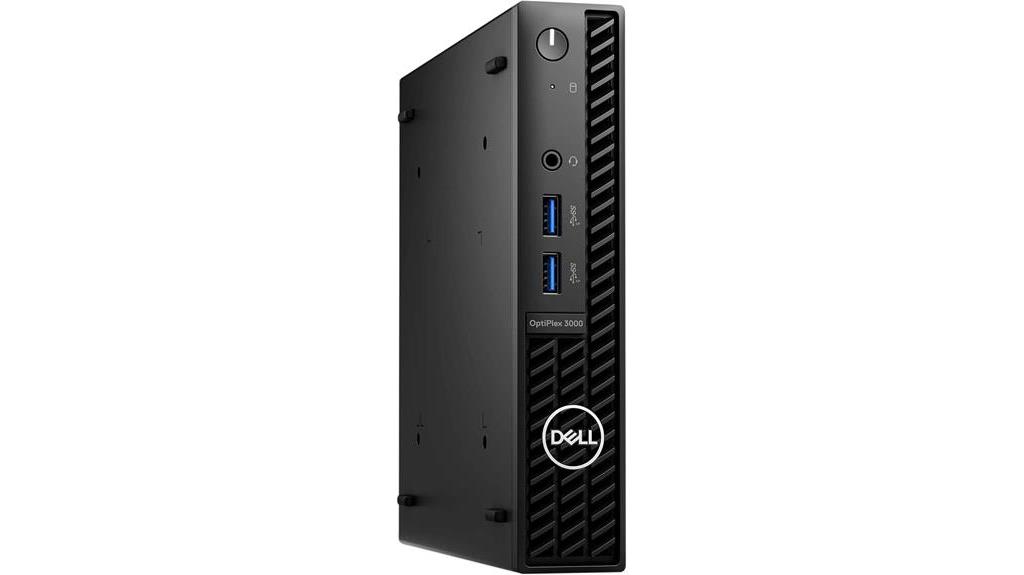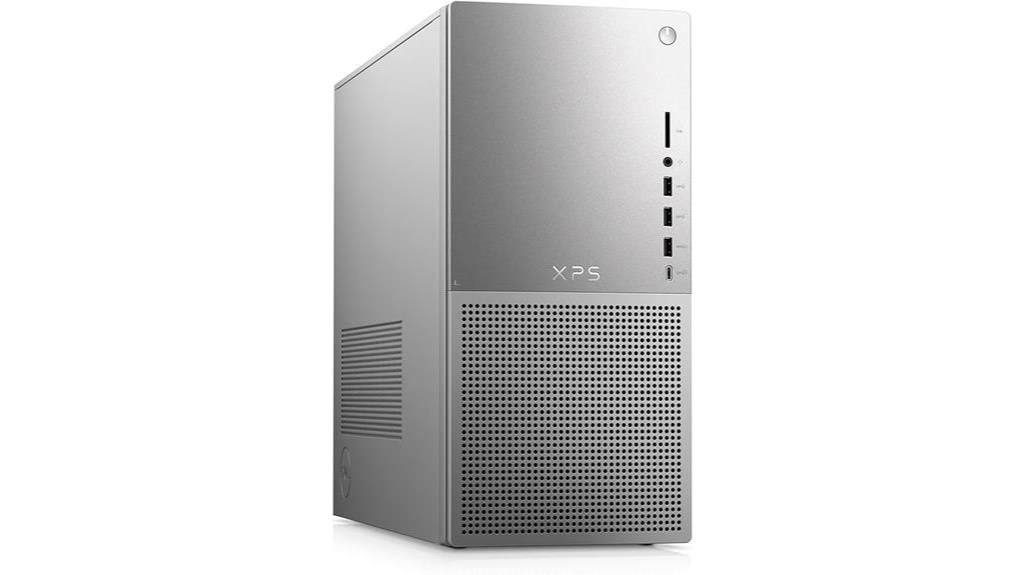



The NK-J1 Mini PC emerges as a compelling choice for network-centric applications, offering a robust set of features that cater to the demands of today's network administrators and enthusiasts. With its powerful Intel Celeron processor, generous memory, and ample solid-state storage, this compact device promises to deliver efficient performance for a range of network security, routing, and home networking tasks. While the mixed customer feedback and price point may give pause, a closer examination reveals a well-built, versatile solution that could prove invaluable for those seeking a compact, yet capable, networking platform.
Key Takeaways
- The NK-J1 Mini PC is powered by a Quad-Core Celeron J4125 processor, providing efficient performance for network security, routing, and home networking tasks.
- The device offers 8GB LPDDR4 RAM and 256GB M.2 SATA SSD, enabling multitasking and ample storage, with a modular design for memory upgrades.
- The four Intel Gigabit Ethernet ports offer robust connectivity, making the NK-J1 suitable for managing complex home automation systems and supporting open-source network security platforms.
- While the device boasts a solid aluminum body and large heatsink for durability, the mixed customer satisfaction rating of 3.5 stars suggests potential performance and compatibility concerns.
- The NK-J1's value proposition should be carefully evaluated based on specific needs, budget, and performance requirements, as the older processor generation and higher price point may be limitations for some users.
The physical design of the NK-J1 mini PC is a notable aspect of the product, featuring a compact and durable construction. The device's solid aluminum body and giant heatsink suggest a well-engineered thermal management system, which is essential for maintaining stable performance. When comparing the hardware specifications to competing options, the NK-J1's use of the Intel Celeron J4125 processor may be a potential drawback, as newer and more powerful processors are available at similar price points. However, the device's versatility in supporting various operating systems, including Windows, Linux, and Ubuntu, makes it a viable option for network appliance tasks. Ultimately, users should carefully evaluate their specific needs and budget to determine if the NK-J1 is the most cost-effective solution for their requirements.
Features and Benefits
The NK-J1 Mini PC boasts a powerful quad-core Celeron J4125 processor, supported by 8GB of LPDDR4 RAM and a 256GB M.2 SATA SSD for efficient performance. The device also features four Intel Gigabit Ethernet ports, allowing for versatile network connectivity options. These hardware specifications position the NK-J1 as a capable platform for network-centric applications, such as firewalls, routers, and other network security solutions.
Quad-Core Celeron J4125 Processor
Intel's Quad-Core Celeron J4125 processor is a capable and energy-efficient chip that powers the NK-J1 Mini PC, providing a balance of performance and power efficiency for various computing tasks. With a base clock speed of 2.0GHz and a turbo boost up to 2.7GHz, the processor delivers impressive performance for everyday productivity, web browsing, and light gaming. Its four cores and four threads guarantee smooth multitasking, while the efficient 10nm architecture helps keep power consumption and heat generation in check. While the J4125 may not be a powerhouse for intensive gaming or multimedia workloads, it offers sufficient processing power for network security, routing, and other specialized applications the NK-J1 is designed for, making it a suitable choice for its intended use cases.
GB LPDDR4 RAM
Equipped with 8GB of LPDDR4 memory, the NK-J1 Mini PC offers strong multitasking capabilities and efficient data throughput, optimizing performance for a variety of computing workloads. The LPDDR4 (Low-Power DDR4) architecture delivers excellent memory performance, boasting low power consumption and high bandwidth to handle multiple applications simultaneously. While the 8GB configuration is sufficient for most users, the NK-J1's modular design allows for future memory upgrades, providing flexibility to accommodate growing computing needs. Whether tasked with network security, file hosting, or media streaming, the NK-J1's memory subsystem guarantees seamless and responsive operation, making it a capable contender in the mini PC market.
56GB M.2 SATA SSD
Complementing the robust 8GB of LPDDR4 memory, the NK-J1 Mini PC features a 256GB M.2 SATA solid-state drive (SSD) that provides ample storage capacity and lightning-fast data access. The M.2 SATA interface, a compact and versatile standard, enables the SSD to deliver superior sequential read and write speeds compared to traditional hard disk drives (HDDs), enhancing the overall system responsiveness to a great extent. The generous 256GB storage capacity assures that users can store a substantial amount of data, applications, and media files without worrying about running out of space. The combination of high-speed performance and generous storage capacity makes the NK-J1 Mini PC a compelling choice for a wide range of computing tasks.
Intel Gigabit Ethernet Ports
The NK-J1 Mini PC features four robust Intel Gigabit Ethernet ports, each capable of delivering data transfer speeds up to 1000 Mbps, guaranteeing seamless and high-bandwidth connectivity for a wide range of networking applications. With this level of Ethernet performance, users can enjoy reliable and high-speed network connectivity, making the device well-suited for tasks such as network security, firewalls, and advanced home network setups. The inclusion of these Intel Gigabit Ethernet ports allows for versatile network integration, enabling users to easily connect the NK-J1 to various network devices and infrastructure, maximizing its utility in diverse computing environments. This feature-rich connectivity guarantees the device can meet the demanding networking requirements of modern computing needs.
Product Quality
With a solid aluminum body and a giant heatsink, the NK-J1 mini PC appears to be built with a focus on durability and thermal management. The device's physical construction suggests an emphasis on creating a robust and reliable product. However, the overall customer satisfaction seems mixed, as indicated by the 3.5-star rating based on two reviews. While the product's build quality may be commendable, factors such as performance, value, and user experience likely play a role in shaping customer perception. Further analysis of the NK-J1's real-world performance and long-term reliability would be needed to provide a more thorough assessment of its product quality. Overall, the NK-J1's physical design hints at a well-built device, but its actual quality in use remains to be fully evaluated.
What It's Used For
The NK-J1 Mini PC is well-suited for network security applications, thanks to its Intel Gigabit Ethernet ports and compatibility with popular network operating systems like pfSense and OPNsense. Its compact form factor and aluminum chassis make it an excellent choice for advanced home networking setups that require a front-end router or firewall. However, the device's 9th generation Celeron processor may be considered outdated compared to newer, more powerful hardware options available on the market.
Network Security Applications
Versatile in its applications, the NK-J1 Mini PC serves as a capable device for network security-oriented tasks, including firewall management, intrusion detection, and soft routing configurations. Its Intel Celeron J4125 Quad Core processor and ample 8GB of LPDDR4 RAM provide the necessary computational power to handle network monitoring and cybersecurity applications effectively. The four Intel Gigabit Ethernet ports, operating at 2.5G speeds, enable robust connectivity and segmentation for complex network architectures. Additionally, the device's compatibility with various open-source network security platforms, such as PFsense and OPNsense, empowers users to tailor the system to their specific security requirements. Overall, the NK-J1 Mini PC's versatility and performance make it a compelling choice for network security-focused applications.
Home Networking Capabilities
Beyond its network security applications, the NK-J1 Mini PC also finds versatility as a front-end solution for advanced home networking setups. Its quad-core Intel Celeron J4125 processor, coupled with 8GB of LPDDR4 RAM, provides sufficient computational power to handle various home networking tasks, including intelligent routing, media streaming, and remote access management. The four Gigabit Ethernet ports allow for seamless integration with multiple network devices, making the NK-J1 an ideal choice for managing complex home automation systems and enabling remote access to home resources. While the J4125 processor may be considered outdated, the NK-J1's overall hardware configuration and connectivity options make it a viable option for users seeking a capable and compact home networking solution.
Processor Performance Considerations
A key consideration when evaluating the NK-J1 Mini PC is its processor performance, as the device's suitability for certain applications will largely depend on the capabilities of its Intel Celeron J4125 quad-core processor. While the J4125 is a capable chip, it is a 9th-generation model that may be considered somewhat outdated compared to more recent Intel offerings. Concerning power consumption efficiency, the J4125 is reasonably efficient, making the NK-J1 suitable for 24/7 network appliance tasks. However, its gaming performance is limited, as the processor lacks the raw horsepower and graphics capabilities required for demanding gaming workloads. Overall, the J4125 processor strikes a balance between performance and efficiency, positioning the NK-J1 as a capable network device rather than a high-powered general-purpose computer.
Product Specifications
The NK-J1 Mini PC is equipped with an Intel Celeron J4125 quad-core processor that operates at a base clock speed of 2.0GHz and can turbo boost up to 2.7GHz, providing a balance of performance and efficiency. Complementing the processor is 8GB of LPDDR4 RAM and a 256GB M.2 SATA SSD for fast data access.
| Specification | Details |
|---|---|
| Processor | Intel Celeron J4125 Quad Core |
| RAM | 8GB LPDDR4 |
| Storage | 256GB M.2 SATA SSD |
The device offers a variety of connectivity options, including four Intel Gigabit Ethernet ports, two USB 3.0 ports, HDMI, and VGA. It supports a range of operating systems, including Windows 10, Windows 11, and Linux distributions.
Who Needs This
Designed as a compact and versatile network appliance, the NK-J1 Mini PC caters to users seeking a powerful yet energy-efficient solution for a range of applications. The target audience for this device includes network administrators, home users with advanced network setups, and those interested in network security and firewalls. The NK-J1 is well-suited for use cases such as PFsense, OPNsense, and other network-centric operating systems. Its four Gigabit Ethernet ports, solid aluminum body, and large heatsink make it an attractive choice for intelligent routing, network security, and other demanding network tasks. While the older processor may be a consideration, the NK-J1's compact form factor and versatility make it a viable option for users with specific network-focused requirements.
Pros
Although the device uses a somewhat older processor, the NK-J1 Mini PC boasts several notable advantages that make it a compelling choice for network-focused applications. This compact powerhouse features:
- Robust connectivity options, including 4 Intel Gigabit Ethernet ports capable of up to 2.5G speeds, providing ample bandwidth for advanced networking tasks.
- Impressive power efficiency, with the low-power Celeron J4125 CPU delivering reliable performance while maintaining a modest thermal footprint.
- A solid aluminum chassis with a large heatsink, ensuring effective cooling and long-term reliability, even under sustained workloads.
- Broad compatibility with various operating systems, including Windows, Linux, and popular network-oriented distributions like pfSense and OPNsense.
Cons
While the NK-J1 Mini PC offers several compelling features, it also presents a few drawbacks that potential customers should consider. One key concern is the device's use of a 9th generation Intel Celeron J4125 processor, which may be perceived as somewhat dated compared to more recently released hardware options. Additionally:
- The processor's performance, though adequate for many network appliance tasks, may not keep up with the demands of more resource-intensive applications.
- The device's price point, while not exorbitant, may be higher than some comparable mini PCs on the market with more up-to-date components.
- The lack of newer connectivity options, such as USB 3.1 or USB-C, could be a drawback for users seeking the latest interface standards.
- The limited customer reviews and relatively low sales ranking may raise questions about the product's long-term viability and support.
What Customers Are Saying
Customer reviews for the NK-J1 Mini PC offer a mixed perspective, with the device garnering a 3.5-star rating out of 5 based on a limited sample size of just two reviews. While customer satisfaction appears divided, the low number of ratings makes it challenging to draw definitive conclusions about the overall user experience. One reviewer praised the device's performance and build quality, but noted that the price point may be higher than comparable options in the market. Another reviewer expressed disappointment with the product, citing concerns about compatibility and technical support. When evaluating the NK-J1, it is essential to take into account both the positive and negative feedback and weigh it against the device's pricing in relation to similar mini PCs available.
Overall Value
Considering the mixed customer feedback and the pricing of the NK-J1 Mini PC in relation to similar devices, the overall value proposition of this product warrants closer examination. While the NK-J1 offers a decent set of specifications, including a quad-core Celeron processor, 8GB of RAM, and a 256GB SSD, the device's performance may not justify its cost when compared to newer, more cost-efficient options on the market. Cost-effectiveness-wise, consumers may be able to find comparable or even superior hardware at a lower price point, potentially diminishing the NK-J1's appeal. Ultimately, the overall value of the NK-J1 will depend on the specific needs and budget of the user, and a thorough performance comparison against competing mini PCs is advisable before making a purchasing decision.
Tips and Tricks For Best Results
To maximize the performance and utility of the NK-J1 Mini PC, users should consider several optimization strategies. Proper ventilation and thermal management are essential, as the device's compact form factor and aluminum body require sufficient airflow to prevent throttling. Additionally, users may benefit from optimizing the operating system and application configurations to align with the system's hardware capabilities, leveraging its quad-core Celeron processor and ample memory. When setting up the device, it's recommended to guarantee adequate cooling, enable performance-oriented power settings, and consider disabling unnecessary background processes. For troubleshooting, users can monitor system temperatures, update drivers, and explore advanced configuration options to fine-tune the NK-J1's performance based on their specific usage requirements and workloads.
Conclusion
The NK-J1 Mini PC offers a compelling hardware configuration and versatile operating system compatibility, positioning it as a capable network appliance for various applications. However, its relatively dated processor and potential availability of more cost-effective alternatives in the market may temper the enthusiasm for this particular model. While the device may still be a suitable choice for certain network security or routing tasks, users looking for a longer-term investment may want to contemplate future upgrades and weigh the cost-benefit analysis more carefully. Ultimately, the NK-J1 Mini PC can be a practical solution, but its value proposition may be outweighed by newer and potentially more competitively priced options in the mini PC market.
Frequently Asked Questions
Is This Device Compatible With All Versions of Windows?
The device is compatible with a variety of operating systems, including Windows 10, Windows 11, and Linux distributions such as Ubuntu. The manufacturer provides software updates and 24/7 customer support to guarantee compatibility and peak performance across platforms.
What Is the Maximum Storage Capacity Supported?
The device supports up to 256GB of M.2 SATA SSD, providing ample storage for your needs. While the fixed storage capacity may limit future expansion, the compact design and powerful performance make it well-suited for network appliance tasks with efficient data management.
Does the Device Come With a Power Adapter?
The device comes bundled with a compatible power adapter that supports the power requirements of the system. Users also have the option to use alternative power supply solutions as long as they provide the necessary voltage and amperage to power the mini PC.
Can the Ethernet Ports Be Upgraded to 10gbe?
"Necessity is the mother of invention." The ethernet ports on this device cannot be directly upgraded to 10GbE, as that would likely require a redesign of the networking components. However, using adapters or additional cards could provide the performance benefits of 10GbE networking options.
How Difficult Is It to Set up the Device for Network Operations?
Setting up the device for network operations generally involves straightforward network configuration, though troubleshooting any connectivity issues may require technical expertise. The ease of setup depends on the user's familiarity with network administration and the specific requirements of the intended usage.
Disclosure: As an Amazon Associate, I earn from qualifying purchases.







